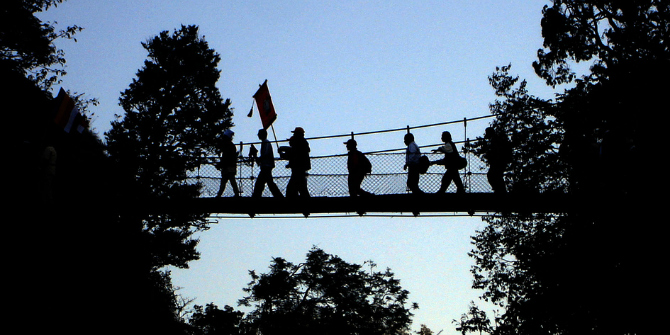
 Having an impact on policy is an important part of demonstrating the wider contribution of academic work and expertise. The Policy Fellowships Programme was set up as part of a wider commitment to find increased and better ways for scientific expertise and evidence to be considered in public policy. Nicola Buckley and Charlotte Sausman explain the background to the programme, emphasise the importance of facilitating relationships which develop over time and across many interactions, and reflect on some of the key factors to success. These include a focus on policy questions posed by policy professionals, the active engagement of researchers from all disciplines, and input from beyond universities.
Having an impact on policy is an important part of demonstrating the wider contribution of academic work and expertise. The Policy Fellowships Programme was set up as part of a wider commitment to find increased and better ways for scientific expertise and evidence to be considered in public policy. Nicola Buckley and Charlotte Sausman explain the background to the programme, emphasise the importance of facilitating relationships which develop over time and across many interactions, and reflect on some of the key factors to success. These include a focus on policy questions posed by policy professionals, the active engagement of researchers from all disciplines, and input from beyond universities.
The Centre for Science and Policy (CSaP) was established at the University of Cambridge in 2009, by a group of leading scientists and engineers keen to find increased and better ways for scientific expertise and evidence to be considered in public policy. CSaP’s mission is to improve public policy through more effective use of evidence and expertise.
One of the centre’s core programmes is its Policy Fellowships Programme, which recruits policy professionals from national and local government, public bodies, industry, civil society, and international organisations to apply for a competitive scheme. This offers a service whereby each Policy Fellow embarks on a flexible professional development programme alongside their job, starting with five days spent at the University of Cambridge, meeting with relevant researchers from a wide range of disciplines. Over two years, Policy Fellows continue to benefit from support and involvement with the network’s activities. At the end of two years, the most active are invited to become Continuing Fellows, while others join the Alumni Network.
Since its launch in 2011 the programme has brought more than 280 Fellows to Cambridge, and reached more than 1,500 academics and other experts. The Fellowship is now recognised across the university as the go-to network to connect research with the policy world, and as an opportunity for policymakers to tackle problem-solving in innovative ways, enhance professional development, build networks, and access expertise. In this short piece we describe how the scheme has developed and draw out some reflections from practice.
 Image credit: Let’s shake on this via Unsplash. This work is licensed under a CC0 1.0 license.
Image credit: Let’s shake on this via Unsplash. This work is licensed under a CC0 1.0 license.
Why is it important to establish better links between academia and policymakers?
As members of the research community we are already aware that having an impact on policy is an important part of demonstrating the wider contribution of academic work and expertise. At the same time, policymakers are encouraged to address policy problems by bringing in available evidence and research knowledge. Policy impact is often described (and frequently measured in Research Excellence Framework assessment terms) as a discrete process linking the research of an individual academic to a set of policy decisions. The work of CSaP and the Policy Fellows Programme shows how these interactions are more likely to occur from facilitating relationships which develop over time and across many interactions.
It has been argued that researchers and policymakers inhabit different worlds and it can be difficult for both groups to understand and navigate each others’ motives and ways of operating. Policy cycles and research cycles are rarely aligned and whilst policymakers may be looking for available research findings with which to address complex questions, research programmes are often set up to allow researchers necessarily long time periods to address focused questions in depth. As a result, policy may not be informed by robust empirical evidence. And research may not produce findings that easily translate into addressing pressing policy questions, where findings from several disciplines need to be consolidated.
Through the Policy Fellowships Programme, civil servants are able to spend time away from a busy policy role to meet a wider range of researchers, who may have different and unexpected perspectives on policy issues, as well as offer insights from leading academic thinking. Policymakers are also able to challenge researchers on how their research might have a bearing on the specific policy questions they are attempting to address.
Developing good practice
Key elements to the Policy Fellowships Programme include:
- A focus on policy questions posed by policy professionals. Each Policy Fellow poses five or six policy questions that would benefit from academic input, and these questions inform the identification of up to 50 or more researchers and other experts invited to meet the Policy Fellow. Each Policy Fellow tends to meet 25-30 experts who accept the invitations to meet over five days of immersive meetings in Cambridge.
- Policy questions addressed by the programme are varied in nature. They include questions in the science and engineering domain such as: “In the transformation of heat production in the UK, which technologies could be delivered at scale and what technology and infrastructure options are there?” Some questions call for input from disciplines in social sciences in particular, such as: “Why don’t people think privacy is important and what are the consequences of taking this position?” There are also questions about the process of using evidence in government, like: “How can government build robust evidence bases within appropriate timeframes to inform responses to novel and continually evolving challenges?”
- Researchers “opt in” to meet Policy Fellows. Researchers are invited to meet Policy Fellows, which means that connections are likely to be made in a spirit of enthusiasm, interest, and goodwill.
- Active engagement of researchers from all disciplines. Policy questions often benefit from input from several disciplines. So, CSaP staff spend time building up networks across the university and beyond, to build awareness of research going on amongst the widest possible range of researchers.
- Input from beyond the university. Representatives from the technology and life science companies based in the Cambridge area, and representatives from local government and civil society organisations are also invited to meet with Policy Fellows.
- CSaP staff members as “knowledge brokers”. Time is spent organising the connections between academics and policymakers. Investment has also been made in database software, which supports the linking of Policy Fellows with researchers.
- Charging appropriate fees. A fee is charged to Policy Fellows’ organisations for their participation in the scheme. The fee is at a level that may be accessed by those in middle and senior level management positions, from professional development or other budgets.
- Providing continued support and developing alumni. Support is provided for two years, after which Policy Fellows continue to receive event invitations and news from CSaP. A Continuing Fellowship programme is offered to the most engaged and active Policy Fellows after they have completed the programme.
Reflections from practice
- Despite the fact that a number of senior members of the university already have links into the policy world, a structured programme has been able to grow the number and quality of interactions, bringing new researchers into this area of activity.
- The focus on the policy questions suggested by policy professionals has enabled the programme to address the “demand side” of policy needs for expertise and evidence.
- The multidisciplinary nature of the set of researchers who meet each Policy Fellow has been a key strength of the programme. Policy Fellows often comment that meetings with researchers working in fields seeming tangential to the areas of focus were the most stimulating and likely to provoke new insights.
- Continual feedback from participants and refinement has been important to the ongoing development of the programme. Gathering feedback and evaluation data from academics as well as Policy Fellows in order to understand how the programme is working, and how it can be improved.
Next Steps
- CSaP now works with five affiliate universities in the UK to extend the programme, with a further day of meetings for some of its Policy Fellows.
- Extending the model – CSaP has advised a number of international universities and government bodies about potentially mirroring some CSaP activities, with a group of universities in the Frankfurt area of Germany going on to set up their own programme last year.
For more information please contact Nicola Buckley: nicola.buckley@csap.cam.ac.uk
Note: This article gives the views of the authors, and not the position of the LSE Impact Blog, nor of the London School of Economics. Please review our comments policy if you have any concerns on posting a comment below.
About the authors
Nicola Buckley is Associate Director, Centre for Science and Policy, University of Cambridge.
Charlotte Sausman is Senior REF Impact Coordinator, University of Cambridge, working on social sciences research impact. She has a background in public policy research, a particular interest in public policy impact and previously coordinated the university’s research initiative on public policy.








What is DOI of this article? Is their academic paper?
Hi Sergey,
Unfortunately our posts are not yet assigned DOIs on publication. This particular post is not based on an academic paper, no.
You can still cite it as you would another web resource. If you need any further information please feel free to contact us at impactofsocialsciences@lse.ac.uk